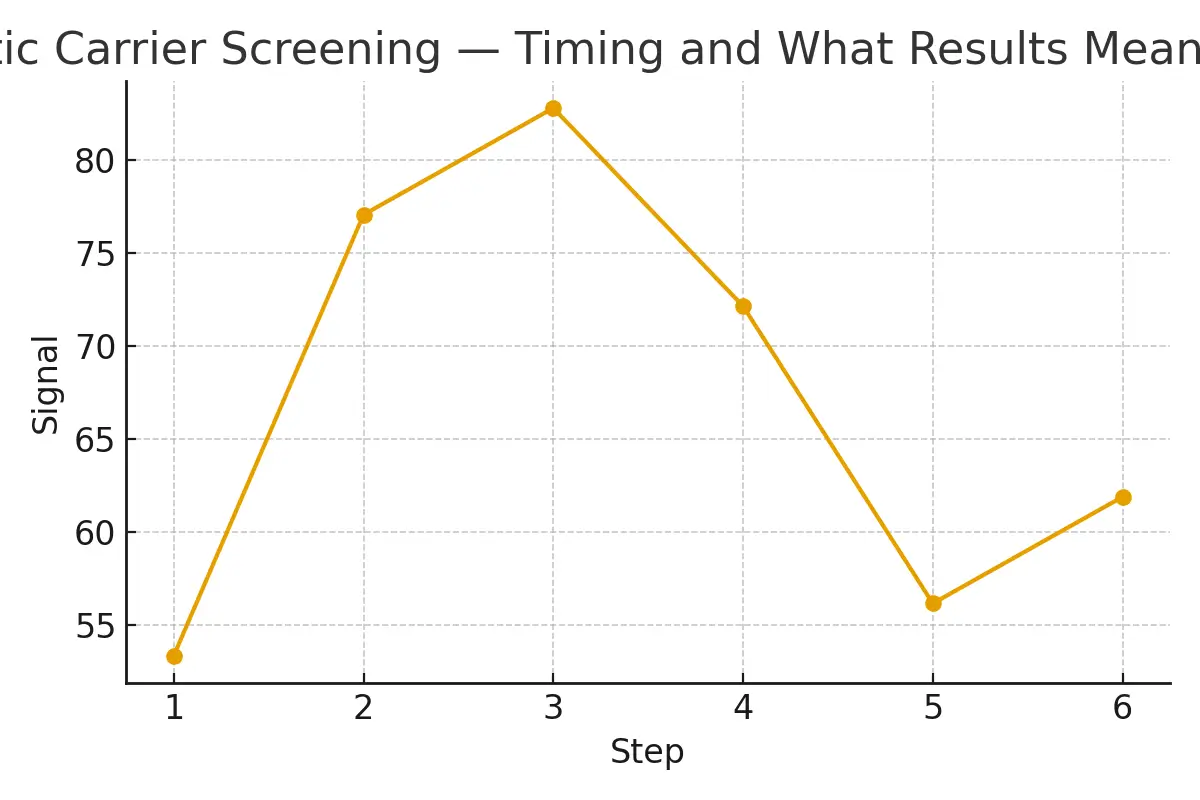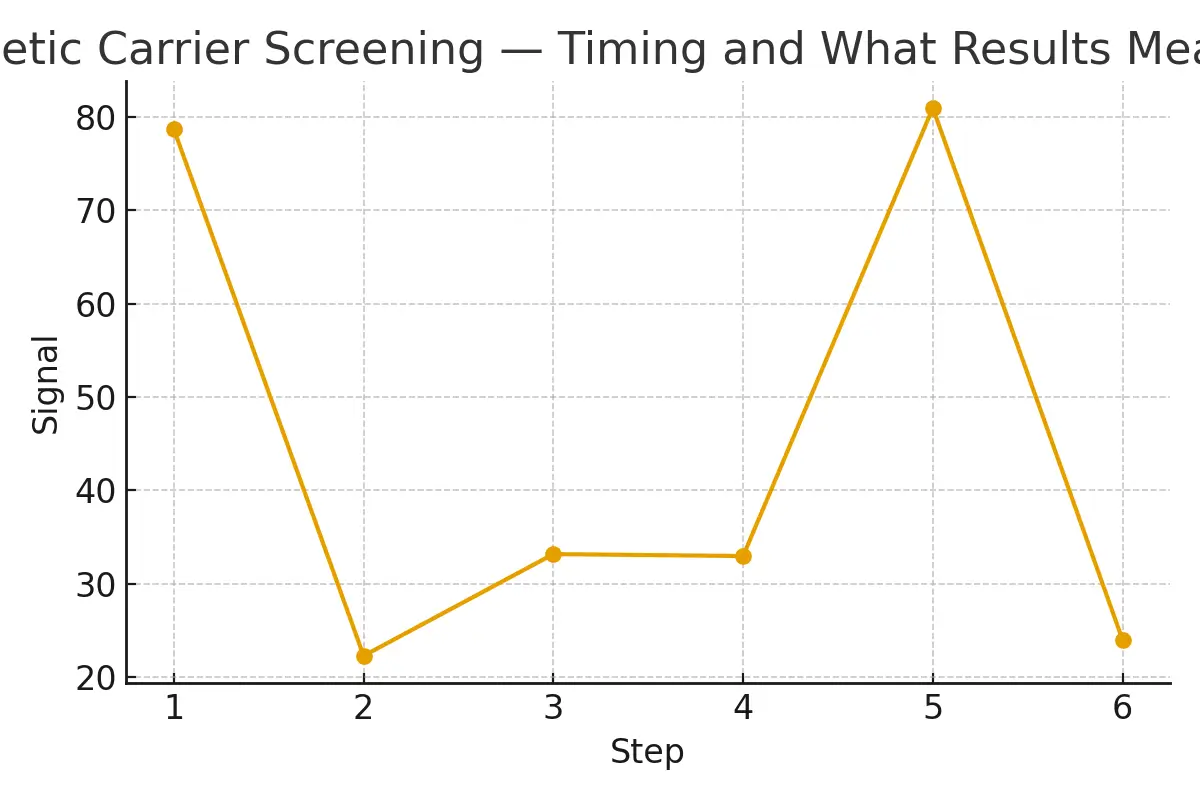
Fertility treatment today is more informed and precise than ever, thanks to advanced testing like genetic carrier screening. This test helps identify whether intended parents carry genetic conditions that could affect their future child. Within the Fertility Testing & Diagnostics pathway, understanding the timing of screening and interpreting results correctly is essential for making informed, emotionally sound, and cost-effective decisions. This article walks you through the IVF journey in NYC, explaining how timing impacts outcomes, realistic cost expectations, and how to simplify your care plan for better results.
1) Definitions and Where This Fits in the Journey
Genetic carrier screening is a blood or saliva test used to detect if either partner carries gene mutations that could cause inherited conditions in a child. It’s typically done before IVF or conception, ensuring embryos can be screened or selected responsibly.
In the fertility journey, carrier screening fits early, right after your initial consultation and before ovarian stimulation begins. At this stage, clinics in NYC may combine it with hormone testing (AMH, FSH) and semen analysis for a complete diagnostic profile.
2) Eligibility Signals and When to Escalate or Pause
Most fertility specialists recommend genetic screening for:
- Couples with a known family history of genetic disorders.
- Those planning IVF with preimplantation genetic testing (PGT).
- Donor egg or sperm recipients, where matching reduces carrier overlap.
- Couples of different ethnic backgrounds with varying genetic risk profiles.
If results show both partners are carriers for the same condition, your fertility specialist may escalate to a genetic counselor or consider PGT-M (genetic testing for monogenic diseases). If results are negative or low risk, you can proceed confidently with IVF planning.
3) Step-by-Step with Timing Checkpoints
Timing is key to minimizing delays:
- Pre-Consultation Phase: Request genetic screening during your first clinic visit.
- Cycle Planning: Wait for results (typically 2–3 weeks) before egg retrieval or embryo transfer scheduling.
- If Using Donors: screen both donor and recipient early to avoid cycle mismatches.
- Result Review: Discuss results with your fertility team in NYC to align future IVF steps.
- Next Steps: Based on outcomes, finalize medications, PGT plan, and cost structure before stimulation begins.
By aligning these checkpoints, patients reduce both stress and unnecessary costs, while improving IVF success rates.
4) Pros, Cons, and Practical Costs with Line-Item Examples
Pros:
- Early risk identification and informed decision-making.
- Enables healthy embryo selection during IVF.
- Prevents emotional and financial strain from uncertain outcomes.
Cons:
Typical Costs (NYC range):
- Carrier screening test: $300 – $1,000 per partner
- Genetic counseling session: $150 – $250
- PGT-M (if needed): $3,000 – $6,000
- IVF cycle (base): $10,000 – $18,000
These prices vary by clinic and insurance coverage. However, many NYC fertility centers now bundle these services, offering transparent cost breakdowns to avoid hidden surprises.
5) Outcome Drivers You Control vs Those You Monitor
You Control:
- Timing your tests early in the process.
- Submit complete medical records promptly.
- Choosing an IVF clinic with transparent communication and lab quality.
You Monitor:
- Lab accuracy and genetic counselor recommendations.
- IVF cycle response and embryo development.
- Clinic’s success rate with similar age groups and fertility profiles.
When patients coordinate timing and decisions efficiently, outcomes like time to pregnancy and live-birth probability improve significantly.
6) Questions to Ask Your Clinic
- When should I complete my genetic carrier screening in the IVF process?
- How do you handle cases where both partners are carriers?
- Can I use my existing test results from another lab?
- What are the total costs, including PGT and counseling?
- How do these results affect my IVF timeline or donor options?
Clear answers here build trust and predictability—two essentials in the fertility journey.
Expert Quote
“Protect timing and keep plans simple—quality improves when noise goes down.”
— Clinical Team, Surrogacy4All
Patient Case Study
A couple from Manhattan faced inconclusive genetic tests early in their fertility journey. By realigning testing schedules, reviewing donor options, and keeping communication clear, their team reduced wait times and achieved pregnancy within two IVF cycles. The key was timing—starting screening early, reviewing results promptly, and optimizing each stage without unnecessary delays.
Testimonials
- “The steps finally made sense.” — A.&J., Manhattan
- “Costs were clear; no surprise bills.” — L., Hoboken
- “Nurses replied fast with practical coaching.” — K.&V., Queens
Next Steps with Surrogacy4All
If you’re exploring IVF or fertility treatment in NYC, Surrogacy4All offers free 15-minute nurse consultations, lab upload for second opinions, and personalized cost breakdowns. Our goal is to simplify complex fertility care—making timing, costs, and success rates clear for every patient.
Visit our website to start your journey toward confident, informed, and successful fertility planning today.
Frequently Asked Questions (FAQs)
Q: When is the best time for genetic carrier screening in IVF?
Ans. Ideally, before starting ovarian stimulation or embryo creation, so results can guide embryo selection.
Q: Does insurance cover genetic testing in NYC?
Ans. Some plans do, especially when there’s a medical indication or family history. Always confirm coverage before testing.
Q: How do genetic carrier results affect IVF success rates?
Ans. Identifying compatible embryos through PGT can improve live-birth rates by preventing genetically incompatible transfers.
Q: Can donor eggs or sperm be screened too?
Ans. Yes, reputable NYC fertility clinics screen donors to ensure genetic compatibility and lower inherited risk.
Q: What happens if both partners are carriers for the same condition?
Ans. Your clinic may recommend PGT-M testing or donor gametes to ensure safe and healthy embryo selection.

Dr. Kulsoom Baloch
Dr. Kulsoom Baloch is a dedicated donor coordinator at Egg Donors, leveraging her extensive background in medicine and public health. She holds an MBBS from Ziauddin University, Pakistan, and an MPH from Hofstra University, New York. With three years of clinical experience at prominent hospitals in Karachi, Pakistan, Dr. Baloch has honed her skills in patient care and medical research.






